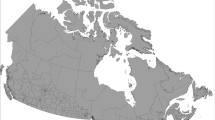
Overview
- Provides the foundation for a new multidisciplinary field
- Examines spatial and geographical aspects of subjective well-being
- Combines perspectives from positive psychology with subjective well-being, regional science, and economics
Part of the book series: Contributions to Regional Science (CRR)
Access this book
Tax calculation will be finalised at checkout
Other ways to access
About this book
This book offers readers a spatial understanding of happiness and subjective well-being. By integrating spatial and geostatistical methods, it sheds new light on the spatial and geographical aspects of subjective well-being. Geographical analysis allows us to measure spatial and regional discrepancies in subjective well-being and to identify heterogeneous profiles in terms of social, economic and environmental patterns. Consequently, the papers gathered here address various topics concerning the spatial aspects of subjective well-being, including social injustice, age, new urban spaces, and tourism.
The book proposes a multidisciplinary approach and is intended for scholars and students in the fields of geography, economics and the spatial sciences. By examining several critical dimensions of happiness and subjective well-being, it enriches the complexity of regional decision-making on the path toward happier and more liveable societies.
Similar content being viewed by others
Keywords
Table of contents (8 chapters)
-
Front Matter
Editors and Affiliations
About the editor
Bibliographic Information
Book Title: Geography of Happiness
Book Subtitle: A Spatial Analysis of Subjective Well-Being
Editors: Eric Vaz
Series Title: Contributions to Regional Science
DOI: https://doi.org/10.1007/978-3-031-19871-7
Publisher: Springer Cham
eBook Packages: Economics and Finance, Economics and Finance (R0)
Copyright Information: The Editor(s) (if applicable) and The Author(s), under exclusive license to Springer Nature Switzerland AG 2023
Hardcover ISBN: 978-3-031-19870-0Published: 21 February 2023
Softcover ISBN: 978-3-031-19873-1Published: 22 February 2024
eBook ISBN: 978-3-031-19871-7Published: 20 February 2023
Edition Number: 1
Number of Pages: VI, 176
Number of Illustrations: 10 b/w illustrations, 24 illustrations in colour
Topics: Regional/Spatial Science, Economic Geography, Employee Health and Wellbeing, Quality of Life Research



